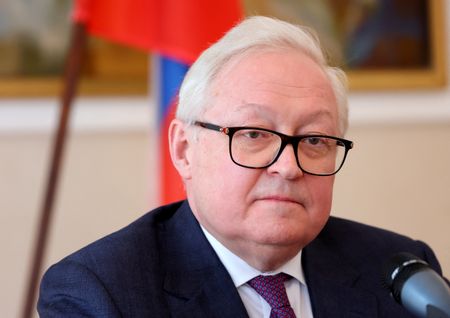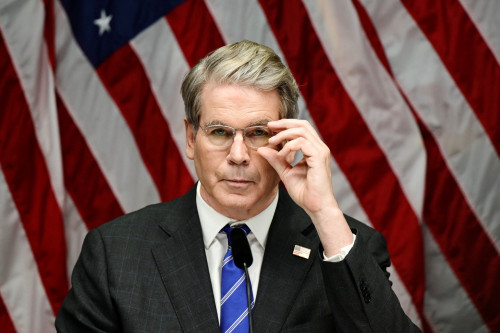By Guy Faulconbridge
MOSCOW (Reuters) -Russia warned the United States on Saturday it should stop brandishing ultimatums over the collapse of arms control agreements, saying Moscow would only return to a nuclear arms reduction treaty if Washington abandons its hostile stance.
Russia and the United States, by far the biggest nuclear powers, have both expressed regret about the disintegration of the tangle of arms control treaties which sought to slow the Cold War arms race and reduce the risk of nuclear war.
Amid the crisis triggered by the Ukraine conflict, President Vladimir Putin announced in February that Russia was suspending participation in the New START treaty – an agreement signed in 2010 that limits the number of Russian and U.S. deployed strategic nuclear warheads.
The United States said this week it would stop providing Russia some notifications required under the treaty, including updates on its missile and launcher locations, to retaliate for Moscow’s “ongoing violations” of the accord.
Russia’s point man for arms control, Deputy Foreign Minister Sergei Ryabkov, said Washington had informed Moscow about the move ahead of going public with it so it was no surprise.
But Ryabkov said the pillars of arms control were collapsing and were in a “semi-lethal” condition due to what he cast as the hostile policies of the United States.
“Talking to the Russian Federation in the language of ultimatums just does not work,” Ryabkov told Russia’s three main news agencies.
“Through the fault of the United States, many elements of the former architecture in this area have either been completely destroyed or moved in a semi-lethal state.”
DETAILED ASSESSMENT
The United States is eager to begin discussions with Russia on a strategic arms limitation pact to replace New START when it expires in 2026, U.S. national security adviser Jake Sullivan said on Friday.
Ryabkov said Russia would give a detailed assessment of Sullivan’s remarks later.
After the fears of nuclear war triggered by the 1962 Cuban Missile Crisis, the United States and the Soviet Union sought to slow the arms race with what ultimately became a tangle of arms control agreements which gave each side greater understanding of their foe’s arsenal and capability.
Both Moscow and Washington, which still control about 90% of the world’s nuclear weapons, slashed the number of their weapons as the Soviet Union crumbled.
The New START Treaty, struck in 2011, obliged the United States and Russia to limit deployed intercontinental ballistic missiles, deployed submarine-launched ballistic missiles, and deployed heavy bombers equipped for nuclear armaments.
It also put limits on nuclear warheads on those deployed missiles and bombers and the launchers for those missiles. Both sides reached the central limits of the treaty by Feb. 5, 2018, and the treaty was extended to Feb. 4, 2026.
“Our decision to suspend the START Treaty is unshakable,” the TASS news agency quoted Ryabkov as saying. “Our own condition for returning to a fully operational treaty is for the U.S. to abandon its fundamentally hostile stance toward Russia.”
There was one positive glimmer: Ryabkov said the U.S. appeared willing to abide by the 1998 Ballistic Missile Launch Notification Agreement.
“Accordingly, a certain transparency and predictability will remain in this area and will allow us to avoid further dangerous exacerbation,” he said.
(Reporting by Reuters; Editing by Guy Faulconbridge and David Holmes)





